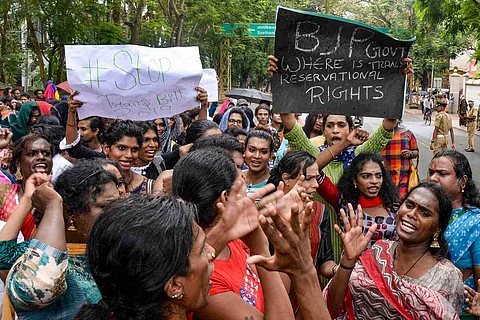

Earlier this week, the Union Ministry of Social Justice and Empowerment constituted the National Council for Transgender Persons as mandated under the Transgender Persons (Protection of Rights) Act, 2019. A gazette notification dated August 21 said that the Social Justice Minister Thaawarchand Gehlot will chair the council, which includes five nominated transgender members – Laxmi Narayan Tripathi, Gopi Shankar Madurai, Meera Parida, Zainab Javid Patel and Kak Chingtabam Shyamcand Sharma. The five nominated members represent the North, South, East, West and North East regions.
Additionally, the council will also include officials from Health and Family Welfare, Home Affairs, and Minority Affairs ministries, and the NITI Aayog. Five experts representing non-governmental organisations working for trans communities are also included. These are Aryan Pasha, the first trans man in India to become a bodybuilding champion; trans activist and board member of Queerala, a Kerala-based LGBTQI organisation, Vihaan Peethambar; activist Reshma Prasad, and Patel Chandubhai Ganeshdas from Ahmedabad.
Gopi Shankar Madurai, founder of Srishti Madurai organisation, who, in 2016 became the first intersex person to contest in the Tamil Nadu polls, told TNIE that the formation of the council was a pathbreaking step to make inclusive policy decisions, and that this could provide visibility to intersex persons who have been invisibilised in legal and policy discourse thus far.
While this is the first time such a council has been set up at the national level, some community members believe that its composition is not representative and there are people who favour the BJP-led central government’s agenda have been favoured to become part of the council. Community members also point out that the Trans Rights Act itself is problematic and regressive, and now the government’s composition of the council in a ‘non-representative and non-diverse manner’ is an insult to injury. The passing of the Act had seen nationwide protests from trans persons and allies earlier as well. Earlier, the Centre’s decision to frame the Trans Act rules amid the lockdown had also drawn flak.
“With the exception of a couple of people like Vihaan Peethambar, the council is composed of people who are either unknown to the trans community or do not hold themselves accountable to the whole community,” says Karthik Bittu Kondaiah, member of Telangana Hijra Intersex Transgender Samiti. “It also appears that some people have been nominated for their craven support for the government and for divisive Hindutva communal politics.”
Grace Banu, founder of the Trans Rights Now collective also pointed out that the council is not diverse or representative enough, and has excluded people from the grassroots. “All of them (in the council) have expressed support for the ruling party. Is that why they have been chosen?” she questions.
While Bittu says that it is common for any government to want to work with the people who also want to work with it, he says that there are many in the trans community who are working at the grassroots and would be willing to work with the government even if they do not agree with Hindutva politics. “But the composition at present is concerning because it seems that people are being rewarded for explicitly supporting Hindutva projects such as the Ram Mandir."
Earlier in 2018, Laxmi Narayan Tripathi, one of the members of the council and a representative of the Kinnar Akhada had voiced support for the Ram temple, which had been condemned by members of the Indian trans, intersex and gender non-conforming communities. A statement from the latter had said, “Laxmi Narayan Tripathi, a dominant-caste brahmin trans woman, has been appealing to Hindutva ideology and justifying the existence of the caste system in India ever since she began aspiring for a political position within the current ruling party. Her position negates the politics of communal harmony that is espoused by Hijras and Kinnars, who have historically maintained a syncretic faith of belonging to both Hinduism and Islam.”
Grace adds that the composition of the council is unacceptable, and that it wasn’t “an equality council, but an injustice council.” “We want people from the community, who have worked with the community to be decision makers. There are at least five lakh trans persons in India – per official figures – and they could find no one from the grassroots?” she argues.
Grace says that the Trans Rights Now collective is looking to file a public interest litigation against the present composition of the council.
Meanwhile, Reshma Prasad a member of the council and founder of Patna-based organisation Dostana Safar told HT that her aim would be “to mainstream the trans community’s concerns, focusing on livelihood issues as well as to raise awareness about the trans community, so that trans persons are accepted within families and in the larger society.”